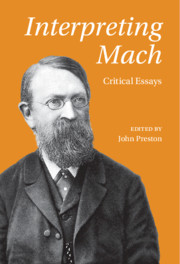Book contents
- Interpreting Mach
- Interpreting Mach
- Copyright page
- Dedication
- Contents
- Figures
- Tables
- Contributors
- Introduction
- 1 Ernst Mach’s Piano and the Making of a Psychophysical Imaginarium
- 2 Mother’s Milk and More
- 3 Meaningful Work
- 4 Mach on Analogy in Science
- 5 Ernst Mach’s Enlightenment Pragmatism
- 6 On the Philosophical and Scientific Relationship between Ernst Mach and William James
- 7 Ernst Mach and Friedrich Nietzsche
- 8 Abstraction, Pragmatism, and History in Mach’s Economy of Science
- 9 Holding the Hand of History
- 10 Ernst Mach and the Vienna Circle
- 11 Narratives Divided
- 12 Phenomenalism, or Neutral Monism, in Mach’s Analysis of Sensations?
- 13 The Case for Mach’s Neutral Monism
- Index
- References
12 - Phenomenalism, or Neutral Monism, in Mach’s Analysis of Sensations?
Published online by Cambridge University Press: 05 March 2021
- Interpreting Mach
- Interpreting Mach
- Copyright page
- Dedication
- Contents
- Figures
- Tables
- Contributors
- Introduction
- 1 Ernst Mach’s Piano and the Making of a Psychophysical Imaginarium
- 2 Mother’s Milk and More
- 3 Meaningful Work
- 4 Mach on Analogy in Science
- 5 Ernst Mach’s Enlightenment Pragmatism
- 6 On the Philosophical and Scientific Relationship between Ernst Mach and William James
- 7 Ernst Mach and Friedrich Nietzsche
- 8 Abstraction, Pragmatism, and History in Mach’s Economy of Science
- 9 Holding the Hand of History
- 10 Ernst Mach and the Vienna Circle
- 11 Narratives Divided
- 12 Phenomenalism, or Neutral Monism, in Mach’s Analysis of Sensations?
- 13 The Case for Mach’s Neutral Monism
- Index
- References
Summary
Ernst Mach’s works have often been interpreted as presenting some version of idealism, such as phenomenalism. However, Erik C. Banks’ recent case for the rival neutral monist reading seems persuasive. But it still leaves a problem: how to explain why so many intelligent and thoughtful readers, some of them sympathetic to Mach, thought of him instead as some kind of idealist. I set out the major factors which tempt people into reading Mach thus and assess the strengths and weaknesses of these two readings.
- Type
- Chapter
- Information
- Interpreting MachCritical Essays, pp. 235 - 257Publisher: Cambridge University PressPrint publication year: 2021
References
- 3
- Cited by

